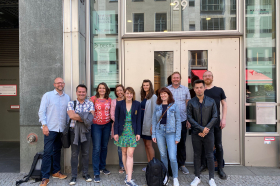The e-ManTRA project has started its second year with a meeting between the seven European partners in Berlin on June 14 and 15.
These two days of discussions, workshops and exchanges were an opportunity to make progress on the various achievements of the project and were aimed to finalise, by September, the two guides respectively intended for teachers/trainers and students in training to become transport managers at EQF level 5.
Teachers/ Trainers guidelines
The Guidelines for developing and implementing digital training were developed on the basis of a survey conducted among teachers and trainers in Finland, France, Germany, Romania, Spain and Sweden, and a literature review carried out by the partners. They are composed of four parts:
- Guidelines presenting the different modalities of distance learning, their advantages and disadvantages, as well as advice and best practices for the successful transition from face-to-face to digital training.
- An inventory including 55 innovative pedagogical methods, tools and approaches selected by the partners to ensure inclusive, dynamic and diversified distance or blended training for learners.
- Pedagogical scenarios for teaching specific learning objectives of transport manager training. They aim to help teachers and trainers to combine different methods and tools in order to implement new e-learning or hybrid training offers and provide learners with an exciting and motivating learning experience.
- An online decision making tool that allows teachers and trainers to quickly find the most appropriate modality for their needs (e-learning, virtual class, hybrid training, etc.) as well as the appropriate teaching methods and tools.
Student guidelines
The second guide aims to help learners to adapt to online and distance training. Its content is the result of research and a creative workshop held in March with the project partners in order to reflect on factors that may influence learners' persistence and risk of dropping out during online and distance learning. The group discussions also helped to:
- Gather ideas and tips that learners can adopt to deal with concentration problems during online courses,
- Find ways to get organised and reduce the risk of demotivation by working on self-motivation.
These best practice sheets will be supplemented by an online quiz that allows students to identify their own weaknesses and then receive targeted suggestions based on the guide.
What's next?
The second half of the project will permit us to develop three digital training tools:
- A virtual platform for group work,
- A card game on European Social Regulations,
- An escape game on the realisation of a transport plan with the objective of providing the client with a competitive solution with a minimal carbon impact.
All the resources developed within the framework of this project will then be tested in real life in the six participating countries between January and March 2023.
If you know of any high schools or training centers that might be interested, please let us know!

